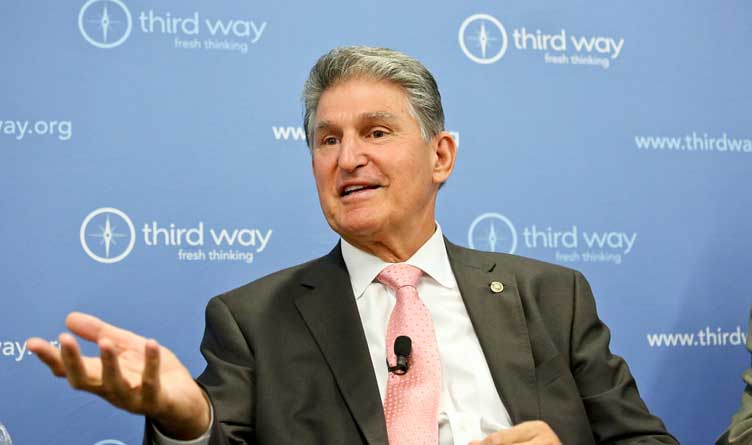Photo: Sen. Joe Manchin, D-W.V.
Photo Credit: Third Way Think Tank / CC
Published August 12, 2021
The Center Square [By Casey Harper] –
On the heels of passing a $1 trillion infrastructure bill, Senate Democrats passed a $3.5 trillion budget resolution Wednesday that sets Congress up for a major battle later this year.
The budget resolution does not enact legislation but does instruct the relevant committees to draft legislation allocating the $3.5 billion in proposed spending. That legislation is expected to be completed in September, and House Speaker Nancy Pelosi, D-Calif., has said she will not move on the infrastructure legislation until the $3.5 trillion plan is ready as well.
That sets up a major fight over both items later this year, especially since Democrats are expected to attempt to use budget reconciliation to pass their larger plan without Republican support. To accomplish this, Democrats cannot afford to lose many Democratic votes, putting extra scrutiny on centrist Democrats.
Notably, Sen. Joe Manchin, D-W.V., said Wednesday he had “serious concerns” about the plan, potentially jeopardizing Democrats’ proposal, at least in its current form.
“However, I have serious concerns about the grave consequences facing West Virginians and every American family if Congress decides to spend another $3.5 trillion,” he said in a statement. “Over the past year, Congress has injected more than $5 trillion of stimulus into the American economy – more than any time since World War II – to respond to the pandemic.”
*** Click Here to Support Conservative Journalism in Tennessee. We can’t bring you articles like this without your support!***
Manchin also pointed to rising inflation costs.
“These are not indications of an economy that requires trillions in additional spending,” he added. “Every elected leader is chosen to make difficult decisions. Adding trillions of dollars more to nearly $29 trillion of national debt, without any consideration of the negative effects on our children and grandchildren, is one of those decisions that has become far too easy in Washington. Given the current state of the economic recovery, it is simply irresponsible to continue spending at levels more suited to respond to a Great Depression or Great Recession – not an economy that is on the verge of overheating.”
Meanwhile, Senate Minority Leader Mitch McConnell said he will block raising the debt ceiling if Democrats try to ram the $3.5 trillion plan through without Republican support, potentially setting up a government shutdown.
“The American people elected a 50-50 Senate, an incredibly close House of Representatives, and a president who pledged to govern down the middle and unify the country,” McConnell said on the Senate floor. “But as soon as President Biden, Speaker Pelosi, and Leader Schumer got the keys, they handed them right over to the far left. Remember, Democrats inherited three safe and effective vaccines that were already rolling out nationwide and an economy that was primed to come roaring back. But our colleagues pressed ahead with a massive springtime spending package that even liberal experts said would drive inflation. And it did.”
New inflation data came out the same day as the budget resolution’s passage, adding weight to McConnell’s claims. The Bureau of Labor Statistics released consumer price index numbers Wednesday that showed inflation had increased 5.4% in the past 12 months, the highest level in more than a decade.
“Overall inflation has risen at the fastest rate in nearly thirteen years,” McConnell said. “Core inflation’s hit its highest level in almost thirty years. Families are getting hit by higher prices everywhere – from the grocery store, to the gas station, to their housing costs. Small businesses have had trouble reopening because would-be workers are getting a government bonus to stay home.”
In June alone, inflation increased nearly an entire percentage point, the highest one-month increase since the 2008 financial crisis. That spike has raised prices on goods and services, especially for energy costs, vehicles and travel. However, significant price increases have also had an impact widely across other industries.
“The index for all items less food and energy rose 4.3 percent over the last 12 months, while the energy index rose 23.8 percent,” BLS said.
These figures have raised concerns with some economists and garnered more opposition for the budget resolution, since federal debt is offset by printing more currency.
Critics have already taken issue with certain provisions in the larger spending plan, including elements of the green new deal, tax hikes, and amnesty for millions of migrants, though those details will not be finalized until bill text is released, likely in September.
“This isn’t a serious attempt at governing,” said Minority Whip Steve Scalise, R-La., referring to those provisions. “It’s them trying to transform America to fit their radical agenda.”
Many Republicans criticized the plan, saying it is too expensive as the nation’s debt levels continue to rise.
About the Author:

Casey Harper, The Center Square D.C. Bureau Reporter – charper@centersquare.com
Casey Harper is a Senior Reporter for the Washington, D.C. Bureau. He previously worked for The Daily Caller, The Hill, and Sinclair Broadcast Group. A graduate of Hillsdale College, Casey’s work has also appeared in Fox News, Fox Business, and USA Today.





